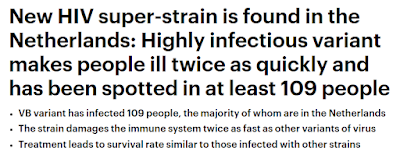The British newspaper 'Daily Mail' has revealed that a new strain of HIV 'AIDS' has been discovered in the Netherlands, a highly contagious type that makes people sick twice as fast, and it has been detected in at least 109 people.
According to the newspaper, the VB variant has infected 109 people, most of them in the Netherlands, and the strain has been proven to destroy the immune system twice as fast as other types of viruses.
and treatment leads to a rate of survival similar to that of infected people. along with other strains, the strain destroys the immune system and somehow weakens the person's ability to fight infections.
and everyday illnesses. Faster than previous versions of the virus, this means that those who contract this strain can develop AIDS faster.
The VB variant also has a viral load between 3.5 and 5.5 times higher than the current strain, meaning those infected are more likely to transmit the virus to other HIV viruses.
but researchers have warned that the rapid deterioration of health after BV infection means early detection and treatment are "crucial".
Britons are advised to get tested for HIV and STIs at least once a year, and more than 100,000 Britons and 1 million Americans are thought to be living with HIV.
Independent experts said the finding was not cause for concern Analysis found that BV emerged in the 1980s and has been declining since 2010, with genotype analysis indicating BV first emerged in the late 1980s and 1990s in the Netherlands.
The discovery, which was published in the journal Science, is the result of an international collaboration between the University of Oxford's Big Data Institute and the Dutch HIV Monitoring Foundation. The team, which is collecting HIV samples from across Europe and Uganda, discovered 17 cases, says the journal of the new breed.
The newspaper pointed out that, just like Corona, HIV mutates very quickly but the vast majority of these changes do not make a difference in the nature of the virus, two cases occurred in Switzerland and Belgium, while 15 samples from the strain VB were collected from individuals in the Netherlands.
The team examined positive samples from more than 6,700 people in the country for its spread.
This process identified another 92 people infected with the variant, from all parts of the Netherlands, bringing the total of confirmed cases to 109 , but the actual number is likely to be higher, as the team examined samples They sequenced HIV from a global database but did not find any other cases, however, they said that there were "probably at least a few" international cases of the strain.
By analyzing the genetic variation between samples, the team estimated that the VB variant first appeared in the late 1980s or 1990s in the Netherlands, and found that it spread faster than other strains in the first decade of the 21st century before declining since 2010 in response to large-scale care.
It's unclear how the variant arose, but the team said one option may be an unusually long infection in a person who hasn't undergone treatment to stop the virus from multiplying and growing.
Scientists don't yet know how the variant is more transmissible and damaging to the immune system, the researchers note.
People infected with the strain have the same characteristics, including age and sex, as other people living with HIV in the Netherlands.
Further studies of the variant's mechanisms could reveal new parts of the virus that can be targeted by drugs, experts said.
Prior to this study, the genetics of HIV were known to be linked to virulence, which means that the evolution of a new variant could alter its effect on health, said Dr.
Chris Wymant, senior researcher in statistical genetics at Oxford University and lead author.
Professor Christoph Fraser, an expert in pathogen dynamics at the university and lead author of the study, explained:
"Our findings underscore the importance of the WHO guidelines, which say people at high risk of infection with HIV have access to regular testing to enable early diagnosis, followed by immediate results.The time during which HIV can destroy an individual's immune system and endanger their health, and it also ensures that HIV is deleted as quickly as possible, preventing transmission to others.
Follow more news on egy4ever








0 تعليقات
You can share your ideas with us and display them on the site